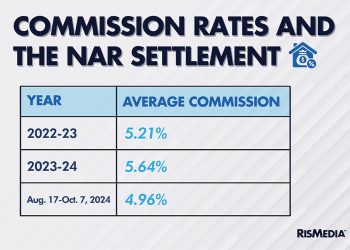A business closing often isn’t the end for the property it was built upon—shuttered businesses can be prime opportunities for redevelopment. These unfortunate situations can create openings in the market and opportunities for redevelopment.
A silver lining from the demise of the silver screen
Connecticut-based firms Spinnaker and Eastpointe, for example, are approaching the completion of a project that saw the shuttered Showcase Cinemas in Bridgeport, Connecticut, demolished and replaced with an apartment complex.
“We have two buildings, there’s a 69-unit building with two guest suites, and a 231-unit building,” said Bill Finger, co-managing partner of Eastpointe. Finger estimated the project will be completed by Q1 2023.
A similar renovation is occurring in Raleigh, North Carolina, where Dominion Realty Partners is turning former AMC Classic Raleigh 15 (movie theater) into the 260-unit Atlantic Springs Place Apartments complex. In the next city over of Chapel Hill, North Carolina, Parkway Holdings Phase Two LLC, VIP Chapel Hill LLC and Harry A. Kazazian partnered to convert the Regal Timberlyne movie theater property into a 20,000-square-foot medical office facility.
As was the case for many businesses, the COVID-19 pandemic expedited the closing of many movie theaters across the United States. These aforementioned North Carolina theaters were just two of the 630 theaters that closed their doors between the outbreak in March 2020 and December 2021, Bloomberg reported. After an initial surge of urban small businesses closing in the early days, other business owners were able to readjust with a greater emphasis on e-commerce. Theaters, which require in-person attendance, could not adapt in the same manner, and they’re far from alone.
Shopping for a new life
Shopping malls are in a similar state of decline. In a New York Times report on this phenomenon, the real estate analytics firm Green Street estimates that for the 1,000 malls they track, 750 are home to empty “anchor boxes,” or large sections designed to house large retailers. The report also found that the COVID-driven bankruptcies of retailers like Brooks Brothers and JC Penny fueled the decline of malls. This underlines the precariousness of malls’ market positions; they’re the businesses most contingent on the success of other businesses.
The Alderwood Mall, located in the Seattle, Washington suburb of Lynwood, which has operated since 1979, has undergone a large-scale renovation. As reported by Bloomberg, developers such as Brookfield Properties are turning large, vacant swaths of the property into a 300-unit apartment complex: Avalon Alderwood Place.
This trend of malls being turned into mixed-use property goes back before the pandemic. In 2013, the Arcade Providence, located in Providence Rhode Island and the oldest mall in America (having been constructed in 1828) was reopened as a mixed apartment and business complex. These projects represent a middle ground between development and preservation.
Pumping up inventory
The Arcade’s fate isn’t the only proof that an esteemed legacy isn’t enough to hold off innovation or market forces. In Philadelphia, Pennsylvania, 2145 N. Front Street, the site of the gym featured in the “Rocky” film series, was recently confirmed to be under renovation. The site will be converted into four apartments with a 1,276 square foot ground floor commercial space
The business most naturally suited to be turned into apartments are hotels, and in Farmington, Connecticut, one of these projects is underway. The local Marriot is being turned into a living complex that will host 224-apartments (renting from $1,100 to $1,800 a month depending on size) and amenities such as a pool, fitness center and restaurant/bar. Similar projects are in place across the country.
Extended stays
In Mesa, Arizona, Vivo Living is in the process of creating an apartment complex out of a former Ramada Inn. In Pinellas County, Florida, Miami firm Eagle Property Capital Investments LLC and Mexico City private-equity firm Promecap have partnered for a renovation. Two local hotels, the 95-room TownePlace Suites and the 88-room Residence Inn (both operated by Marriott St. Petersburg Clearwater) will be converted into a single-living community named “Pelican Lake Apartments.”
Hotels are another business that demands in-person attendance, but unlike aforementioned businesses, they are also contingent upon travel. Covid prompted a decrease in travel, and thus less use for hotels.
The loss of these businesses is another’s gain. That ongoing redevelopment projects focus on creating housing speaks to a real estate market issue frequently cited by agents: inventory, or lack thereof. Of the benefits the Spinnaker/Eastpointe project will have to the Bridgeport, Connecticut community, Finger cited a greater supply of market-rate housing in the area.
What good is more housing if people don’t want to live in it, though? This shapes the areas that are targeted for these projects. Asked about the types of properties Spinnaker favors for construction and investment, Spinnaker VP of Development Frank Caico says, “Urban/suburban and near a train station, great access to a highway, and also part of a neighborhood.”
Caico adds, “The other thing I would say is it’s a very different environment in the Northeast and Connecticut where a lot of our communities are already very built out so availability of properties or land to redevelop is not as plentiful as in other markets. Then the entitlement process tends to take much longer, whereas in some of these other markets it’s easier maybe to find opportunity but you’re competing with a lot more folks. Even though it’s easier to build in some of these other markets you almost have to be a little more careful because there’s so much more competition because the barriers to entry are lower.”
That doesn’t mean renovations come without challenges, though. Indeed, COVID has actually erected greater hurdles to redevelopment owing to supply chain disruptions.
Bryan Robik, Finger’s fellow co-managing partner at Eastpointe, elaborated on the challenges his firm has recently faced: “Uncertainty of construction costs, particularly lumber was one we encountered but that’s a little stabilized now or appears to be stabilized. Generally, anticipating increases in the marketplace.”
Construction isn’t the only place where the question of cost presents itself. The former AMC Classic Raleigh 15 property was purchased by Jonathan Greenwood’s Asprings, LLC, for $3.9 million—a huge drop from the previous owners’ $13.3 million price that was paid in 2010. County records show the property has an assessed value of $3.75 million.
Likewise, Rodrigo Conesa, managing principal at Eagle Property Capital Investments, says of his firm’s purchase: “Negotiations for the two hotels began during the peak of the Covid-19 crisis, allowing us to negotiate an attractive price for two high-quality properties that are ideally suited for conversion to apartments.”
The renovation of these businesses may be the developers’ area of expertise, but to perform that renovation, they need to complete the sale. Navigating those sales is where brokers and agents come in.
Devin Meenan is RISMedia’s assistant editor. Email him your story ideas at dmeenan@rismedia.com.











